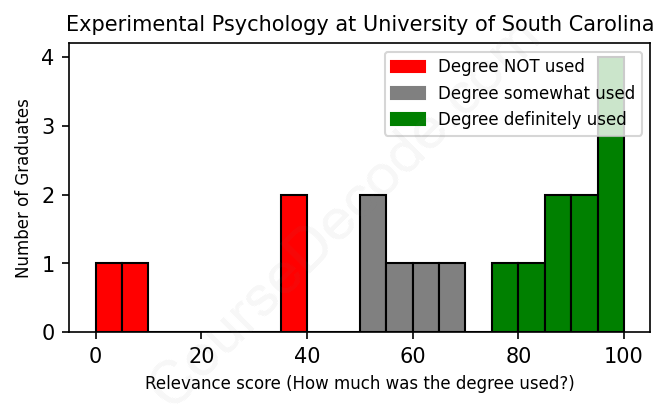
First, some facts. Of the Experimental Psychology graduates from University of South Carolina we've analyzed , here's how many have used (or NOT used) their degree in their career:

These are estimates based on AI analysis of 19 LinkedIn profiles (see below).
The verdict? Slightly below average. Overall, with an average relevance score of 66%, Experimental Psychology graduates from University of South Carolina have a slightly lower likelihood (-1%) of finding work in this field compared to the average graduate across all fields:
And for comparison, here's the chart for all profiles we've looked at across all degrees.
Also, after graduating, 63% of these graduates have pursued further education other than another Bachelor's degree (such as a Masters degree or other), compared to the average across all profiles of 35%. This suggests you may need more than just a Bachelors degree to be competitive as a Experimental Psychology graduate.
See the details:
|
Relevance score: 57% We think this person has gone into a career only somewhat relevant to their degree. We think this person has gone into a career only somewhat relevant to their degree.
DEGREE INFOGraduated in 2018 from University of South Carolina with a Bachelor of Arts - BA in Experimental Psychology. No other secondary education since. JOB HISTORY SINCE GRADUATIONIntern Dolphins Plus Aug 2018 - Oct 2018 Intern  Theater of the Sea Inc. Dec 2018 - Apr 2019 Marine Mammal Specialist II  Gulf World Marine Park Apr 2019 - Oct 2021 Associate District Manager  ADP Oct 2021 - Jun 2022 Controller  The Cape Club of Palm City Jun 2022 - Present ABOUTPassionate about providing small businesses with business solutions!ADP is the front runner in helping small businesses streamline their back office practices through their payroll, HR, workers compensation, and benefits solutions. Let me help your business grow to its full potential and achieve your goals. |
The top 10 most common jobs done by the graduates we've analyzed (ranked most common to least) are:
From the analysis of LinkedIn job profiles of graduates with a degree in Experimental Psychology from the University of South Carolina, it seems that the most common roles taken by these individuals span various industries, but there are a few notable trends. Many graduates have found their way into positions that involve mental health and counseling, such as clinical therapists, mental health counselors, or roles in social work. These jobs typically make extensive use of the psychological principles and skills they learned during their studies, enabling them to apply theories and practices in real-life settings. For instance, roles like Licensed Clinical Mental Health Counselor or Psychotherapist are highly relevant and directly tied to their educational background, showcasing the practical application of experimental psychology in clinical settings.
However, not every graduate ended up in positions closely related to their degree. A significant number took on roles in fields like management, sales, or administration, which often lack direct application of the core principles taught in Experimental Psychology. For example, job titles like Sales and Membership Manager or Admissions Officer illustrate a disconnect between their studies and day-to-day responsibilities, as these roles focus more on technical skills rather than psychological expertise. Overall, while many graduates do find relevant positions that utilize their training, there is also a considerable number whose jobs don’t heavily incorporate their specialized knowledge in experimental psychology. This indicates that, while a degree in this field offers valuable insights, its application can be quite broad and sometimes diverges from pure psychology-focused roles.
Here is a visual representation of the most common words in job titles for Experimental Psychology graduates (this is across all Experimental Psychology graduates we've analyzed, not just those who went to University of South Carolina):

When looking at the career trajectories of graduates from the University of South Carolina with degrees in Experimental Psychology, it’s a bit of a mixed bag. For many of these graduates, their first jobs post-graduation tend to be somewhat unrelated to the core of what they studied. For instance, some have worked as optometric technicians or found roles in sales and administration straight out of college. However, there are also quite a few who have managed to stay closer to the realm of psychology, securing positions as mental health counselors or in social services. It seems that while some start in fields that might not feel super relevant, many do find their way back to psychology-related roles as they gain experience and clarity on their career goals.
Fast forward five to ten years, and the picture brightens a bit. A good number of these graduates have transitioned into solid careers that align more closely with their psychology backgrounds. We see individuals taking on significant roles as mental health professionals, clinical therapists, and even directors at counseling centers. While not everyone is working in a direct psychological role, a considerable portion appears to have leveraged their psychology degree into fulfilling careers in mental health, counseling, and even management positions within related fields. So, while the journey can start off a bit wobbly, many of these graduates find a path that resonates with their academic training as they progress in their careers.
So, getting a Bachelor’s degree in Experimental Psychology at the University of South Carolina, or really anywhere, can be a mixed bag. Generally, it’s considered to be fairly challenging but not impossible, especially if you have a solid interest in psychology and research methods. You’ll dive into various topics, conduct experiments, and crunch a lot of data, which can be pretty demanding. The coursework isn’t just about memorizing facts—it’s about understanding theory, mastering statistics, and learning how to design and analyze experiments. If you’re passionate about figuring out how people think and behave, it can be super engaging, but be prepared to put in some serious effort and time. Overall, it tends to be a bit tougher than some more straightforward majors, but it’s definitely manageable if you're willing to work for it!
Most commonly, in the LinkedIn profiles we've looked at, it takes people 4 years to finish a Bachelor degree in Experimental Psychology.
Looking at the job paths of these Experimental Psychology graduates from the University of South Carolina, it seems like they've had a pretty mixed bag in terms of income potential. Some, like the folks who became Optometrists or climbed the ranks to Clinical Director, are likely earning decent salaries—optometry can be pretty lucrative. However, others who started in social work or assistant roles might not be raking in the big bucks just yet. Positions like "Psychosocial Assistant" or "Shift Manager" suggest they might be earning more on the lower end of the pay scale, especially early in their careers. Overall, it varies a lot based on their specific roles and how far they've progressed, but it looks like some are doing well while others are still working their way up!
Here is a visual representation of the most common words seen in the "about" section of LinkedIn profiles who have a Bachelor degree in Experimental Psychology (this is across all Experimental Psychology graduates we've analyzed, not just those who went to University of South Carolina). This may or may not be useful:

Here are all colleges offering a Bachelor degree in Experimental Psychology (ordered by the average relevance score of their Experimental Psychology graduates, best to worst) where we have analyzed at least 10 of their graduates:
| College | Score | Count |
|---|---|---|
 University of South Carolina University of South Carolina
|
66 | 19 |